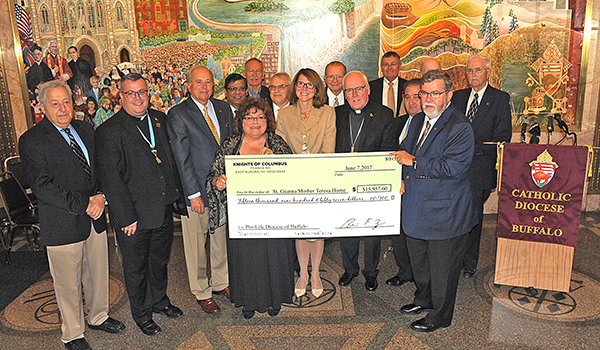Knights of Columbus team with Pro-Life department to bring ultrasounds to area clinics
by PATRICK J. BUECHI
Three organizations in the Diocese of Buffalo have formed a pro-life trinity. The Knights of Columbus and Catholic Health have teamed up with the Office of Pro-Life Activities to bring ultrasound machines to the eight counties of Western New York.
As a response to the promotion of the Culture of Life, the Knights of Columbus have set a goal for placing 1,000 ultrasound machines in pro-life pregnancy centers throughout the country. They feel that this could save the lives of 1 million babies over the next five years. Pregnant women considering an abortion have seen their unborn child as a living being through ultrasound pictures, called sonograms.
The Knights of Columbus have a longstanding program of trying to equip medically certified pro-life pregnancy care centers with modern technology that will enable expectant mothers to see and hear their babies in utero. The Supreme Council matches funds raised by local councils.
In the Diocese of Buffalo, the knights asked Cheryl Calire, diocesan director of Pro-Life Activities, to assist them as a liaison between the knights and the clinics. "She had to get the diocese to sign off and Catholic Health to sign off on this program. Once she got the final approvals, I went ahead and raised the money," said James Grubka, grand knight from the Christ the King of Aurora Council #12829. The council raised nearly $16,000, enough money to purchase two General Electric handheld ultrasound machines.
At a press conference to announce the purchase of the first two of seven to be used in the diocese, Bishop Richard J. Malone said, "Sometimes our Catholic position is only interpreted as being against things - against abortion. We are against those things because we celebrate life, that's the whole point. We celebrate the gift of human life and we revere and protect that life from the moment of conception all through to the moment of natural death, and, as I like to say, every moment in between."
Ultrasound exams, which are medically indicated throughout pregnancy for a variety of diagnostic reasons, use ultrasound waves to scan a woman's abdomen, creating a picture or "sonogram" of the baby in her womb. Supreme Knight Carl A. Anderson said the machines provide a "window on the womb" allowing mothers to "see her developing child, hear her baby's heartbeat, and recognize the miracle of the new life within her." Since the program began, Anderson had received reports of mothers who have decided to carry their babies to term after seeing the ultrasound images.
"The primary reason and focus is to try and save as many lives as we can, but it can also be used for other reasons if need be," Calire said. "We're really excited about the opportunity. Studies have shown that women who have seen the sonogram, hear the heartbeat ,are more likely to connect with the child that they carry, and give it life, so to speak, in their mind and in their heart. When they can make that connection, it is a lot easier for it to be an undeniable fact that they have been given a gift."
Depending how far along the pregnancy is, ultrasounds can find anomalies - such as cardiac, abdominal, fetal obstetrics, pediatric peripheral vascular applications. The smaller portable handheld machines can reach more people in a shorter period of time than the standard hospital models, which are about the same size as the medical professionals who use them. The handheld ultrasound machines are slightly larger than an iPhone, and can display a fetal heartbeat at seven weeks.
"This is a supplement to those larger models because the larger models, when the baby is bigger around 11 and 13 weeks, we are able to visualize more of the organs in the body, so then we are able to do the necessary review of the whole body system to make sure everything is normal and developing properly," explained Aimee Gomlak, vice president of Women's Services at Catholic Health. "This is supplementary, so that we can see a heart beat earlier and more frequently because these do not require an ultrasound tech. This is a nurse, this is a doctor, this is a nurse practitioner. The big ultrasounds are for an ultrasound tech, and an actual specific doctor related to that work, to see the baby in more full dimension."
The goal for the diocese is to have one of the handheld ultrasounds in each of the seven Catholic Health Primary Care Centers, located in Springville, South Buffalo, downtown Buffalo, the city's Cobblestone District, Kenmore-Tonawanda and Niagara Falls. Gomlak expects the first pair to be in the Mercy Comprehensive Care Center on Louisiana Street, and the Ken-Ton FamilyCare center, on Two Mile Creek Road in Tonawanda in a few weeks.
The Pro-Life Office has been looking at using sonograms for three years, weighing the risks and benefits of using them inside the three St. Gianna Molla Pregnancy Care Centers in Erie, Niagara and Chautauqua counties.
"What we found after a lot of investigation was that, particularly in New York state, it makes a lot more sense to connect with other agencies that are currently using sonograms and sonogram equipment than it is to have it on your own premises, based on the laws and liability and turning a center into medical, we felt for the diocese it would be a better route since we already have a relationship with Catholic Health to tap into some of the resources that are available," Calire said.




